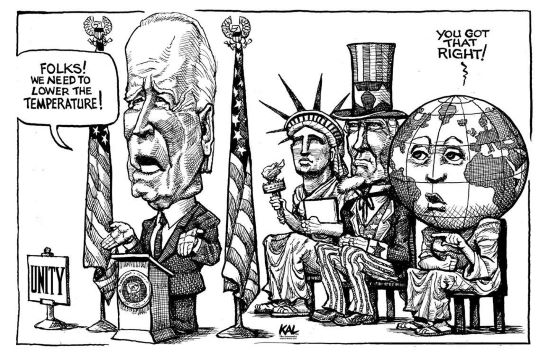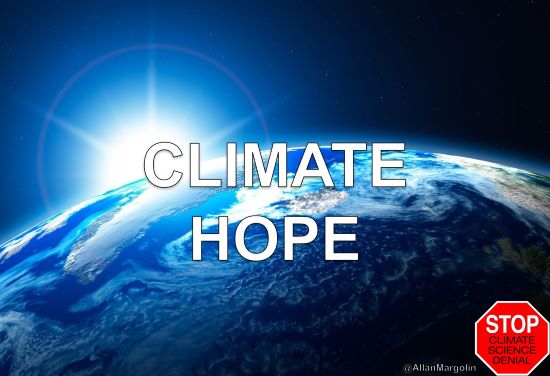2021 SkS Weekly Climate Change & Global Warming Digest #4
Posted on 24 January 2021 by John Hartz
Story of the Week... La Niña Update... Toon of the Week... Video of the Week... Coming Soon on SkS... Climate Feedback Article Review... SkS Week in Review... Poster of the Week...
Story of the Week...
Davos Agenda: What you need to know about saving the planet
- 2020 showed us that action on climate change is more urgent than ever.
- Building back better must include a focus on reaching net-zero, the energy transition and committing to circular economies and sustainable consumption.
- The Davos Agenda will mobilize global leaders to build a healthier, more resilient planet.
A year ago at the Forum's Annual Meeting in Davos – heeding the advice of speakers including Greta Thunberg, UN Secretary-General Antonio Guterres and Prince Charles – government, business and civil society committed to take more concrete action on climate change and save the planet from a hot, smoky, polluted demise.
Throughout the week, delegates watched in horror as bushfires ravaged Australia – ultimately burning more than 11 million hectares of land and killing or displacing as many as 3 billion animals. By the end of the week, a Davos press conference about a new global threat – a highly infectious virus emerging in China – showed the world that we could no longer ignore the links between the health of the planet and the health of humans, economies and societies.
From 25-29 January 2021, The Davos Agenda will bring many of those leaders together again to discuss the innovative and bold solutions needed to stem the pandemic and drive a robust recovery – with a focus on the resiliency and sustainability of our ecosystems and infrastructure.
Click here to access the complete article as originally posted on the World Economic Forum website.
Davos Agenda: What you need to know about saving the planet by Samantha Sault, Agenda, World Economic Forum, Jan 24, 2021
La Niña Update...
La Niña Roars, Unleashing Fire, Drought and Floods Worldwide
In the American West, the drought that paved the way for 2020’s hellscape of wildfires is poised to be even worse this year. Fanning the flames: La Niña.
The weather pattern has reached the peak of its power, wreaking havoc on a world already reeling from an unprecedented string of extreme weather brought on by climate change. Characterized by a cooling of the equatorial Pacific, La Niña triggers an atmospheric reaction that roils commodities markets across the globe—parching cropland in some areas while bringing a flood of rain to others.
In the U.S. West, the biggest threat is drought. Even as long-awaited rain falls this week, water scarcity plagues 78% of 11 western states, according to the U.S. Drought Monitor. January should be California’s wettest month, bringing an end to fire season with frequent rain along the coast and valleys and snow in the Sierra Nevada Mountains. But with La Niña steering the winter away from the state, fire season now seems to be limitless. A record 4.2 million acres burned in the state in 2020, and the threat still hasn’t abated. At least a dozen blazes erupted this month as dry gusts rattled the southern half of the state.
La Niña Roars, Unleashing Fire, Drought and Floods Worldwide by Brian K Sullivan and Mira Rojanasakul, Bloomberg News, Jan 23, 2021
Toon of the Week...

Hat tip to the Stop Climate Science Denial Facebook page.
Video of the Week...
Katy Tur interviews Greta Thunberg and Michael Mann
Climate change activist Greta Thunberg says that the climate goals from the Biden administration are "very far from being in line with the Paris Agreement" but welcomes the new tone from the president.
Katy Tur interviews Greta Thunberg and Michael Mann, MSNBC, Jan 22, 2021
Coming Soon on SkS...
- The SCIARA Project – Interactive Time Travel into the Climate Future (Daniel Tamberg)
- Study: Accounting for the Value of Nature Reinforces the Paris Targets (Dana)
- SkS New Research for Week #4 (Doug Bostrom)
- Environmentalists' Climate Change Myths (Climate Adam)
- Refining the remaining 1.5C ‘carbon budget’ (Dr Kasia Tokarska & Dr Damon Matthews)
- 2021 SkS Weekly Climate Change & Global Warming News Roundup #5 (John Hartz)
- 2021 SkS Weekly Climate Change & Global Warming Digest #5 (John Hartz)
Climate Feedback Article Review...
[To be added.]
Click here to access the detailed analysis of this claim by a panel of experts.
SkS Week in Review...
- Sun: 2021 SkS Weekly Climate Change & Global Warming Digest #3 by John Hartz (SkS Original)
- Mon: Getting involved with Climate Science via crowdfunding and crowdsourcing by BaerbelW (SkS Original)
- Tue: Gillett et al. (2021) global warming attribution study by Dana Nuccitelli (SkS Original)
- Wed: Skeptical Science New Research for Week #3, 2021 by Doug Bostrom (SKS Original)
- Thu: What Biden and Democratic Senate can do on climate in their first 100 days by Dana Nuccitelli (Yale Climate Connections Repost)
- Fri: Analysis: The climate papers most featured in the media in 2020 by Robert McSweeney (Carbon Brief Repost)
- Sat: 2021 SkS Weekly Climate Change & Global Warming News Roundup #4 by John Hartz (SkS Original)
Poster of the Week...
































 Arguments
Arguments






























Suggestion for upcoming digest: Seasonal origin of the thermal maxima at the Holocene and the last interglacial
Unfortunately behind paywall, but seems to elucidate a discrepancy between data and modeling in paleoclimate.
Phillippe Chantreau @1,
Bova et al (2021) 'Seasonal origin of the thermal maxima at the Holocene and the last interglacial' certainly looks to have made some interesting and important findings but as you say it is paywalled. There is a graphic attached to this Rutgers press release which is perhaps a little clearer than the thumb-nails attached to the paywalled paper.
Nature has a review of the Bova article, here.
Boava et al (2021) is also the focus of:
Climate crisis: world is at its hottest for at least 12,000 years – study by Damian Carrington, Environment, The Guardian, Jan 27, 2021
Thanks for the links, the Nature review is very interesting.